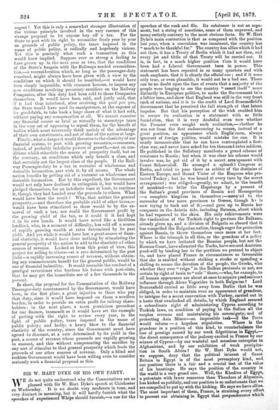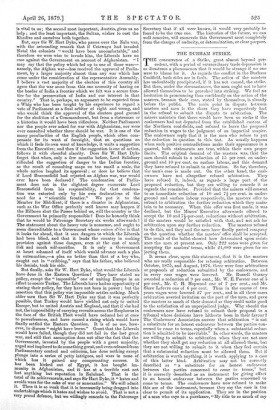In short, the proposal for the Commutation of the Railway
influence through Alexo Vogorides in both Bulgarias Lord our position there is a fair and a crucial test of the value of his boastings. He says the position of the country in SIR W. HART DYKE ON HIS OWN PARTY. the world is a very grand one. Well, the Khedive of Egypt, is vital to us ; the second most important, Austria, gives us no help ; and the least important, the Sultan, wishes to oust the Khedive and ourselves both together.
But, says Sir W. Hart Dyke, who passes over the Zulu war, with the astounding remark that if Cetewayo had invaded Natal the colonists " would have been uncomfortable," and therefore we were wise to invade him, the Liberals have no case against the Government on account of Afghanistan. " I may say that the policy which led up to one of those wars— namely, the Afghan war—has received the approval of Parlia- ment, by a larger majority almost than any war which has come under the consideration of the representative Assembly. I believe a vast majority of the electors of this country all agree that the war arose from this one necessity of having on the border of India a frontier which we felt was a secure fron- tier for the preservation of India and our interest in that country." That is, perhaps, an argument to be expected from a Whip who has been taught by his experience to regard a vote of Parliament as a final arbiter of right and wrong, and who would think the approval of the electors good ground for the abolition of a Commandment, but from a statesman or a historian it would have been ridiculous. Neither Parliament nor the people ever asked for war with Afghanistan, nor were ever consulted whether there should be war. It is one of the many peculiarities of the English people, which often com- pensate for its want of foresight, that on questions on which it feels its own want of knowledge, it waits a suggestion from the Executive ; and then if the suggestion is one of action, follows it with cheerful alacrity. Does Sir W. Hart Dyke forget that when, only a few months before, Lord Salisbury ridiculed the suggestion of danger to the Indian frontier, as the result of consulting maps on too small a scale, the whole nation laughed its approval ; or does he believe that if Lord Beaconsfield had rejected an Afghan war, war would ever have been declared ? The condonation of Parlia- ment does not in the slightest degree exonerate Lord Beaconsfield from his responsibility, for that condona- tion was extorted only by his own declarations of the need for a " scientific frontier." We put it to the Member for Mid-Kent, if there is a disaster in Afghanistan, such as the War Office perfectly well knows may happen if the Hillmen shut the Passes behind us, will the country or the Government be primarily responsible ? Does he honestly think that he would be Patronage Secretary six weeks afterwards ? The' statement about the heavy vote is nonsense, and ought to seem discreditable to a Government whose raison dare is that it looks far ahead, that it sees dangers to which the Liberals had been blind, and that it leads the country in making provision against those dangers, even at the cost of much
risk and much self-sacrifice. It is only a Government at heart ashamed of itself which would advance such a plea in extenuation,—a plea no better than that of a boy who, caught out in "cribbing," says that his father, who believed his denials, took his side.
But finally, asks Sir W. Hart Dyke, what would the Liberals have done in the Eastern Question ? They have stated no policy, except the " impossible" one of uniting Europe in an effort to coerce Turkey. The Liberals have had no opportunity of stating their policy, for they have not been in power ; but the assertion that this policy was impossible settles nothing. Much abler men than Sir W. Hart Dyke say that it was perfectly possible, that Turkey would have yielded not only to united Europe, but to united Austria and England, and that if she had not, the impossibility of carrying recruits across the Bosphorus in the face of the British Fleet would have reduced her at once to powerlessness, and have caused a rising which would have finally settled the Eastern Question. It is of no use, how- ever, to discuss "might have beens." Grant that the Liberals would have failed, though they did not fail in the last great war, and still that assumption does not alter the fact that the Government, invested by the people with a great majority, urged and implored to do something great, and even released from Parliamentary control and criticism, has done nothing except plunge into a series of petty intrigues, and wars in none of which has it gained any compensating success. It has been kicked out of Egypt, it has bought im- munity in Afghanistan, and it has at a terrible cost not lost anything but reputation in Zululand. That is the total of its achievements, and says Sir Hart Dyke, it " hates and avoids wars for the sake of war or annexation." We will admit it. Then it is so weak that it is incessantly being dragged into
undertakings which it hates and wishes to avoid. That is not a very proud defence, but we willingly concede to the Patronage Secretary that if all were known, it would very probably be found to be the true one. The historian of the future, we can well conceive, will exonerate this Government most completely from the charges of audacity, or determination, or clear purpose.



































 Previous page
Previous page